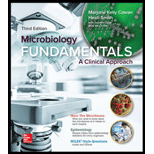
Concept explainers
Allergy and atopy might have evolved in human populations that have had a “sudden” decrease in
- a. vaccinations.
- b. exposure to vitamin D.
- c. exposure to helminth infections.
- d. intake of processed sugar.
Introduction:
Allergy is type of hypersensitivity condition of the immune system generally in response to harmless substances present in the environment. These substances are termed as allergens. Allergic diseases include atopic dermatitis, food allergies, hay fever, and so many.
Answer to Problem 1Q
Correct answer:
Atopy and allergy might have evolved in human populations that have had a sudden decrease in exposure to helminth infections.
Therefore, option (c) is correct.
Option (c) is given as “exposure to helminth infections”.
Explanation of Solution
Justify reasons for the correct statement:
Atopy refers to chronic local allergies. Atopy and allergy evolved in human populations that had a sudden reduction in exposure to helminth infections. This is because the components that produce allergic response were known to defend against helminths and other human parasites.
Hence, option (b) is correct.
Justify reasons for the incorrect statements:
Option (a) is given as “vaccinations”.
Vaccinations were never given in huge amounts. It is not possible that a sudden reduction in vaccination might induce atopy and allergy. Hence, it is a wrong answer.
Option (c) is given as “exposure to vitamin D”.
Reduction in vitamin D is not associated with the development of allergies and atopy. Hence, it is a wrong answer.
Option (d) is given as “intake of processed sugar”.
Reduction in the intake of processed sugar did not induce atopy and allergy in human populations. Hence, it is a wrong answer.
Hence, options (a), (c), and (d) are incorrect.
Allergy and atopy evolved in human populations that have had a sudden reduction in exposure to helminth infections.
Want to see more full solutions like this?
Chapter 14 Solutions
Microbiology Fundamentals: A Clinical Approach
- What is behavioral adaptarrow_forward22. Which of the following mutant proteins is expected to have a dominant negative effect when over- expressed in normal cells? a. mutant PI3-kinase that lacks the SH2 domain but retains the kinase function b. mutant Grb2 protein that cannot bind to RTK c. mutant RTK that lacks the extracellular domain d. mutant PDK that has the PH domain but lost the kinase function e. all of the abovearrow_forwardWhat is the label ?arrow_forward
- Can you described the image? Can you explain the question as well their answer and how to get to an answer to an problem like this?arrow_forwardglg 112 mid unit assignment Identifying melting processesarrow_forwardGive only the mode of inheritance consistent with all three pedigrees and only two reasons that support this, nothing more, (it shouldn't take too long)arrow_forward
- Oarrow_forwardDescribe the principle of homeostasis.arrow_forwardExplain how the hormones of the glands listed below travel around the body to target organs and tissues : Pituitary gland Hypothalamus Thyroid Parathyroid Adrenal Pineal Pancreas(islets of langerhans) Gonads (testes and ovaries) Placentaarrow_forward
- Basic Clinical Lab Competencies for Respiratory C...NursingISBN:9781285244662Author:WhitePublisher:Cengage
 Concepts of BiologyBiologyISBN:9781938168116Author:Samantha Fowler, Rebecca Roush, James WisePublisher:OpenStax College
Concepts of BiologyBiologyISBN:9781938168116Author:Samantha Fowler, Rebecca Roush, James WisePublisher:OpenStax College Human Biology (MindTap Course List)BiologyISBN:9781305112100Author:Cecie Starr, Beverly McMillanPublisher:Cengage Learning
Human Biology (MindTap Course List)BiologyISBN:9781305112100Author:Cecie Starr, Beverly McMillanPublisher:Cengage Learning  Comprehensive Medical Assisting: Administrative a...NursingISBN:9781305964792Author:Wilburta Q. Lindh, Carol D. Tamparo, Barbara M. Dahl, Julie Morris, Cindy CorreaPublisher:Cengage Learning
Comprehensive Medical Assisting: Administrative a...NursingISBN:9781305964792Author:Wilburta Q. Lindh, Carol D. Tamparo, Barbara M. Dahl, Julie Morris, Cindy CorreaPublisher:Cengage Learning





